Idaho had ‘great statesman’ in McClure
Former U.S. senator, Energy Committee head dies at 86

BOISE – Former U.S. Sen. James McClure, who spent six years as chairman of the Energy Committee and fought to keep Idaho’s wilderness areas controlled by the state, has died. He was 86.
McClure, a Republican who served 24 years in Congress, suffered a stroke Dec. 12, 2008, and died Saturday of complications related to that and subsequent strokes, said his son, Ken.
“Jim McClure set a standard for public servants that will endure for generations,” U.S. Sen. Mike Crapo, R-Idaho, said in a statement Sunday. “His unfailing goodwill and respect for others, together with his essential Western conservatism, are still the best model for how to engage today’s public policy debates.”
U.S. Sen. Jim Risch, R-Idaho, called McClure a “principled conservative” who could work with all people to find solutions on difficult issues.
“Idaho has lost a great statesman,” Risch said.
McClure earned a reputation as a nuts-and-bolts legislative craftsman while in Congress and was genial but reserved among most colleagues. He was elected to the U.S. House in 1966, staying there until his election to the U.S. Senate in 1972, where he eventually became the head of the Energy Committee.
“There was nothing phony about the guy,” said former Gov. Phil Batt. “He was just a personification of what an honored politician ought to be. He was a real gentleman, and never disparaged anybody unnecessarily.”
Stories of McClure’s common touch abound. He changed a flat tire in suit and tie, refusing to let staff do the job; showed up at the Teton Dam disaster in jeans and asked to be put to work; and insisted on making a campaign stop at a rural Boundary County post office when his aides said miserable weather justified cancellation.
McClure spent six years in the U.S. House and 18 years in the Senate. Only Sens. William Borah and Larry Craig represented Idaho longer.
McClure championed gun rights, natural-resource industries and energy independence. In Idaho, he helped establish the Frank Church Wilderness and the Sawtooth and Hells Canyon national recreation areas. He won Idaho an equal say in regional energy policy under the Northwest Power Act, with Oregon, Washington and Montana.
On a larger stage, he helped secure the Reagan tax cuts, co-authored the law establishing the Strategic Petroleum Reserve and was a director of both the Kennedy Center for Performing Arts and the Smithsonian Institution in Washington, D.C. In 1989, he was a member of the commission that rewrote the Helsinki human rights accords, which spurred dissident groups and contributed to the collapse of the Soviet Union.
“Lots of legislation that went through Congress had his handwriting on it,” longtime McClure staffer Jim Goller said. “He was a leader, but he never tooted his own horn. He was a good guy to work for – he wanted people to challenge him and have opinions of their own.”
McClure was born and raised in the small town of Payette, Idaho, and served in the Navy from 1942 to 1945. Afterward, he earned his law degree from the University of Idaho and became the Payette County prosecutor and later the Payette city attorney.
McClure seemed to always have clear career goals in mind, and wasn’t afraid to share them. In the 1970s, one biography put out by the senator’s office began, “If someone were to write down all of the qualities needed in a senator from Idaho, he might start by reading a biographical sketch of Jim McClure.”
In 1991, McClure retired from Congress at the age of 72.
“Whatever active life I have ahead of me – and who knows what that is, whether it’s five minutes or five years or 25 years – six years is a pretty big chunk of what’s left,” McClure told the Idaho Statesman as he considered his retirement plans. “And therefore it’s a very, very difficult question.”
But he didn’t completely retire from political life, going on to serve as a lobbyist for interests including Idaho Power Co. and Coeur d’Alene Mine and overseeing Batt’s citizens committees studying deregulation.
McClure’s contributions prompted then-President George W. Bush to sign legislation renaming the federal building in Boise as the James A. McClure Federal Building and United States Courthouse.